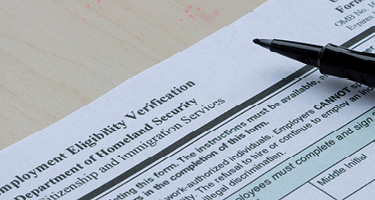This article does not consider federal employees or employees subject to federal regulations, such as DOT-regulated employees.
Many employers find themselves stuck in the weeds trying to navigate marijuana in the workplace among the increased state marijuana legalization efforts sweeping the country. Companies are asking, among many other questions: Should there be different sets of rules for medical marijuana cardholders versus recreational users? Should we test for marijuana at all? And how can we keep our workplaces safe?
Unfortunately for employers, the topic of “marijuana in the workplace” is one of the most convoluted and far-reaching issues that employers currently face. While the topic is complicated and difficult to manage, most employers do not realize that they may have flexibility in enforcing marijuana policies depending on the particular situation.
As of February 2023, medical marijuana is legal in 37 states and the District of Columbia. Many of those states’ laws contain explicit anti-discrimination provisions (i.e., the medical marijuana law itself prohibits taking adverse employment action based on the employee’s medical marijuana cardholder status). Even where the law does not explicitly contain anti-discrimination provisions, a medical marijuana cardholder may still be considered disabled under the Americans with Disabilities Act and similar state disability laws. Additionally, recreational marijuana is currently legal in 21 states and the District of Columbia, and some of those states’ laws have anti-discrimination provisions for recreational users. Making things even more complicated is the rise in indirect protections for marijuana users through “lawful off-duty conduct” (i.e., state laws prohibiting employers from taking adverse action based on an individual’s otherwise lawful activity occurring outside of work).
Unfortunately for employers, the topic of 'marijuana in the workplace' is one of the most convoluted and far-reaching issues that employers currently face."
Notwithstanding employment-based legal claims and risks, even in states with direct or indirect protections for marijuana users, employers can still prohibit their employees from possessing, using or being under the influence of marijuana in the workplace. While this concept sounds simple, this poses its own set of challenges because a traditional drug test does not measure for impairment. Instead, a positive marijuana test only shows that marijuana is in someone’s system; it cannot show whether that person was under the influence of marijuana. Generally, the effects of marijuana can last for hours, but the chemical found in marijuana, tetrahydrocannabinol (THC), can remain in an individual’s system for weeks, depending on usage. In other words, an employee can test positive for marijuana long after its effect has worn off, leaving an employer to question what it can do with a positive marijuana test.
Understandably, employers are incredibly confused as to what to do about marijuana, including trying to balance legal risks with operational preferences and trying to keep the workplace safe while simultaneously struggling with recruiting and retention challenges. Clients pose dozens of questions on this topic, but below are some of the ones that we see most often.
- We just received a positive test for marijuana, and the employee or applicant says that he or she is a medical marijuana cardholder. What now?
First and foremost, ask for a copy of the card! Employers should always confirm that an individual is being truthful and ask for a copy of a medical marijuana card. This is neither a HIPAA violation, nor is it impinging upon someone’s medical privacy interests.
Assuming that an individual is a medical marijuana cardholder, employers should then run through a checklist of questions:
- What is the state of employment which would likely govern employment-related claims (although state of residency might also be pertinent)?
- What type of job is at issue, safety-sensitive or non-safety-sensitive?
- Depending on the answers to #1 and #2, what are the legal risks associated with taking adverse action against the individual?
- What does the company “want” to do?
This checklist will help employers determine a risk profile for any specific situation. While this can go in countless different directions, assuming that an employer ideally “wants” to take action against the individual, a best practice in handling medical marijuana cardholders is to engage in a disability accommodation process with the individual. Employers should remember that there are many outcomes that could arise from the accommodation process, and employers should approach the process with an open mind, just as it would with any other disability accommodation issue.
5. We just received a positive test for marijuana. The employee or applicant says that adult-use of recreational marijuana is legal in our state. What now?
Employers have greater flexibility in taking adverse action against recreational marijuana users than medical marijuana cardholders. A small number of states maintain recreational marijuana laws that contain express protections for recreational marijuana users. And a few states have indirect employee protections for recreational marijuana where an employer cannot take adverse action against an employee or applicant for off-duty, off-premises use of marijuana. However, for now, there are much fewer state laws for employers to navigate in handling recreational marijuana users. As a result, employers will likely face a different and, in most cases, lower risk in dealing with recreational marijuana users.
6. Should we test for marijuana at all?
The answer to this question is largely a business decision first and a legal issue second. Employers should be mindful of the fact that there are generally no requirements under any state drug test laws to conduct testing at all. Employers should make this decision based on business and operational-centric considerations. While there have been a few cities to enact ordinances restricting pre-employment marijuana testing in certain circumstances (e.g., New York City and Philadelphia), generally, there are no restrictions or prohibitions against testing for marijuana.
To be blunt, marijuana testing can present challenges—not necessarily because of the test itself, but because of the potential issues that could arise after a positive test result. Many employers are trending away from marijuana testing, while many others are continuing to test. While this is purely a business decision, employers should remember that the decision to test is not an “all or nothing” issue. Employers could choose to test for marijuana only in certain states, only for certain jobs (e.g., testing only for safety-sensitive jobs), or only in certain circumstances (e.g., taking marijuana out of pre-employment tests but not for reasonable suspicion tests).
In conclusion, employers are struggling–and will continue to struggle–with the many challenges that come with “marijuana and the workplace.” As states continue to enact more or amend currently existing legalization laws, and as courts continue to rule on marijuana-based employment lawsuits, employers will need to adapt to the changing landscape of these laws and legal risks. While not an insurmountable task, it is one that requires careful consideration. Employers should take solace in the fact that they are not the only ones struggling with this challenging topic.
Melanie C. Cormier is an associate at Ogletree Deakins and is part of the firm’s Drug Testing Practice Group. Among her general employment practice, she advises employers on best practices for dealing with workplace marijuana issues, compliance with general drug testing laws and development of policies and procedures. She also assists clients with manager, supervisor and HR training on drug testing and marijuana compliance topics.
M. Tae Phillips is a shareholder at Ogletree Deakins and is co-chair of the firm’s Drug Testing Practice Group. Among his general labor and employment practice, he advises employers on best practices for dealing with workplace marijuana issues, compliance with general drug testing laws and development of policies and procedures. He also assists clients with manager, supervisor and HR training on drug testing and marijuana compliance topics. He is also the creator of Ogletree’s “OD Comply: Marijuana” compliance tool.
































